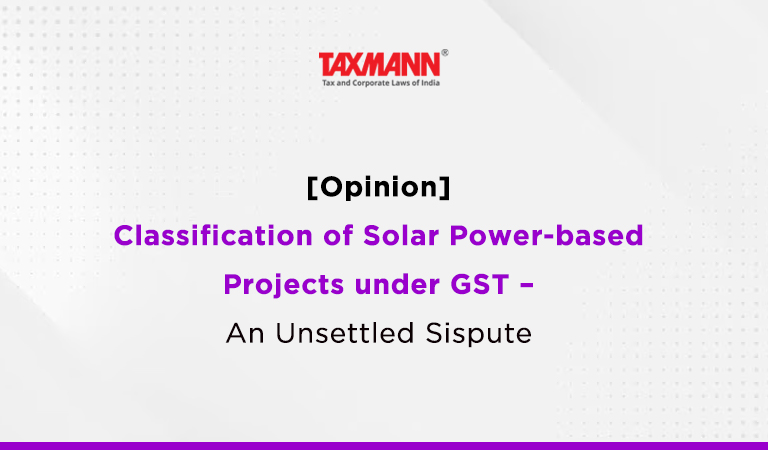[Opinion] Classification of Solar Power-based Projects under GST – An Unsettled Sispute
- Blog|News|GST & Customs|
- 3 Min Read
- By Taxmann
- |
- Last Updated on 1 April, 2023

Sohrab Bararia & Ekta Jhunjhunwala – [2023] 148 taxmann.com 455 (Article)
1. Classification of solar power-based projects – An ambiguous topic since the inception of GST
- Classification of solar power-based projects (solar power generating system, solar power pumping system, etc.) have been an ambiguous matter since the inception of GST. At the time of introduction of GST, the rate notification for goods having Notification No. 01/2017 – Central Tax (Rate) dated 28 June 2017, provided for a specific entry no. 234 under Schedule I (5% GST rate) for specified renewable energy devices and parts for their manufacture including inter alia solar power generating system, solar power based devices. However, no specific clarity existed wrt the applicable rate on solar power-based projects comprising of both supply of goods and services. This resulted in adoption of diversified positions by different industry players wrt classification and GST rates of solar-power based projects involving design, supply, installation, commissioning and testing activities. While some taxpayers have resorted to treat the entire project as supply of goods thereby discharging 5% GST (as per entry no. 234 of Schedule I of rate notification of goods applicable till 30 September 2021), others have treated the same as works contract charging 18% GST (as per the rate notification of services having Notification No. 11/2017 – Central Tax (Rate) dated 28 June 2017). Further, in many cases, the value of goods and services component have been specifically bifurcated in the contract, pursuant to which the taxpayers have discharged GST at 5% on the goods value and 18% on the service value.
- Hence, there was ambiguity all around the classification of solar power projects. The dubiety around classification was not restricted to the taxpayers and even the Departmental authorities and advance ruling/appellate advance ruling authorities were also perplexed with the said classification issue. This resulted in pronouncement of divergent AAR/AAARs on the subject. Further, the taxpayers were saddled with notices with divergent allegations by the Departmental authorities.
2. With an aim to put the above ambiguity to rest, deemed valuation mechanism was introduced pursuant to 31st GST Council Meeting recommendations
- To resolve the disputes regarding GST rates of solar power-based projects involving both supply of goods and services, the GST Council in its 31st meeting decided to introduce a deemed valuation of 70:30 for supply of goods and services respectively in case of projects involving both supply of material and provision of services of construction/engineering/installation, etc. in relation to setting up of solar power-based projects.
- Accordingly, an explanation was inserted in the rate notification of goods under erstwhile Entry No. 234 of Schedule I* to Notification No. 01/2017 – CT Rate dated 28 June 2017 with simultaneous insertion of a new entry, viz. Entry No. 38, in Notification No. 11/2017 – CT Rate dated 28 June 2017, to give effect to the Council’s recommendation. Both these amendments were made applicable w.e.f. 01 January 2019.
*Presently omitted and inserted under entry no. 201A of Schedule II (12% GST rate) to Notification No. 01/2017 ibid. vide Notification No. 8/2021 – Central Tax (Rate) dated 30 September 2021
3. Whether this 70:30 rule has acted as a boon or a bane for the taxpayers?
- Although the introduction of this 70:30 rule have been a boon for some of the industry players for which GST rate of works contract was stated to be applicable. However, for taxpayers whose projects resulted in movable property and/ or projects involving only 5-10% of service element in the entire contract value are ladened with additional GST burden upon introduction of this 70:30 rule.
Click Here To Read The Full Article
Disclaimer: The content/information published on the website is only for general information of the user and shall not be construed as legal advice. While the Taxmann has exercised reasonable efforts to ensure the veracity of information/content published, Taxmann shall be under no liability in any manner whatsoever for incorrect information, if any.

Taxmann Publications has a dedicated in-house Research & Editorial Team. This team consists of a team of Chartered Accountants, Company Secretaries, and Lawyers. This team works under the guidance and supervision of editor-in-chief Mr Rakesh Bhargava.
The Research and Editorial Team is responsible for developing reliable and accurate content for the readers. The team follows the six-sigma approach to achieve the benchmark of zero error in its publications and research platforms. The team ensures that the following publication guidelines are thoroughly followed while developing the content:
- The statutory material is obtained only from the authorized and reliable sources
- All the latest developments in the judicial and legislative fields are covered
- Prepare the analytical write-ups on current, controversial, and important issues to help the readers to understand the concept and its implications
- Every content published by Taxmann is complete, accurate and lucid
- All evidence-based statements are supported with proper reference to Section, Circular No., Notification No. or citations
- The golden rules of grammar, style and consistency are thoroughly followed
- Font and size that’s easy to read and remain consistent across all imprint and digital publications are applied



 CA | CS | CMA
CA | CS | CMA
